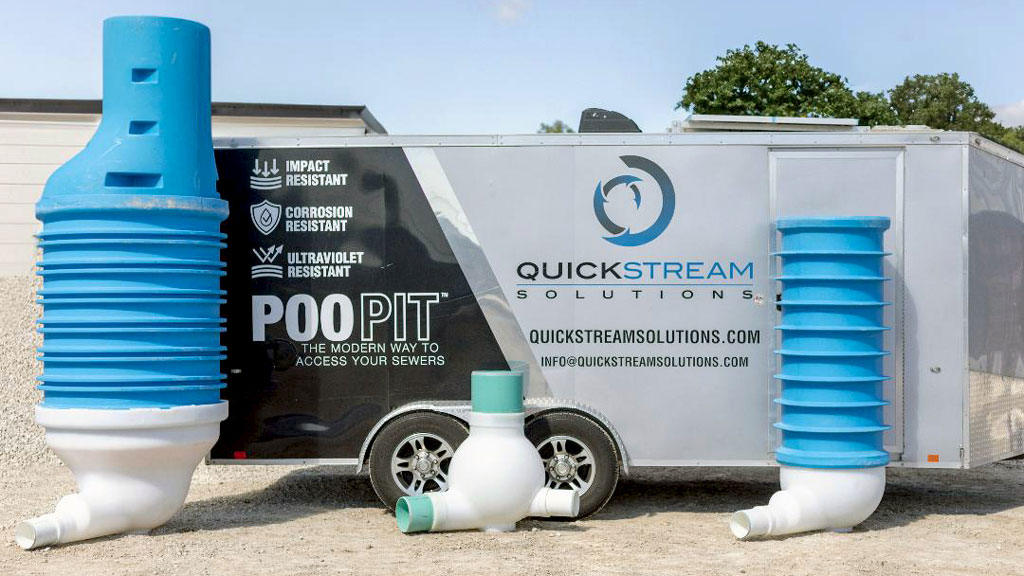Notwithstanding its inauspicious name, the Poo Pit may revolutionize the installation of manholes and save municipalities everywhere a great deal of money.
Daryl Rocheleau, owner of Windsor’s Shearock Construction Group and president of Quickstream Solutions Inc., has obtained the North American distribution rights to the more than two-decade-old Australian technology that creates polyethylene and PVC manholes or “shafts” at a fraction of the price, and which are many times more durable than conventional concrete manholes.
Seeing the technology at a trade show “my first inclination was why didn’t I think of that? Because it was simple and it would be cost effective,” Rocheleau said.
He has been working with municipalities throughout the United States and was able to install a pilot project in the Windsor municipal sewer system in 2019, and now is working with the Ontario government to have the province adapt standards for the device for public works.
“There’s over 100,000 in the ground across Australia,” he says.
Rocheleau chuckles at the Poo Pit name but says it’s typically Australian with that country’s well-known jocularity. But there are actually three models — the 12-inch diameter Poo Pit, the 24-inch Mini Pit and the 38-inch Smart Pit.
Conventional manholes are deficient in so many ways, Rocheleau adds.
“When it comes to safety, when it comes to cost, when it comes to rehab, there’s a lot of problems” with concrete manholes, he says.
Despite its name, manholes, especially these days, are anything but. Workers no longer actually descend into them. They’re access points to check sewer lines and used solely to lower mechanical devices like flushers or inspection cameras.
“The air is bad, it’s a fall hazard,” Rocheleau says. “There’s disease and cockroaches. It’s not a safe place for humans.”
Moreover, the concrete easily breaks down and is porous, allowing ground water to infiltrate and actually add to overflow sewers.
“The concrete breaks down due to the gases inside the sewer,” says Rocheleau. “And the municipalities are spending millions of dollars putting in liners and trying to repair the manholes all the time.”
By contrast Australian company Smartsteam Technology’s device is a “completely sealed system,” and doesn’t allow water to infiltrate.
The “sewer maintenance shaft” as it’s known, is actually a spherical ball with inlet pipes and can be individually tailored to customer specs. The lightweight construction allows manual installation, saving excavators for more rigorous tasks. Upstream and downstream pipes are then connected. Added to that is a vertical riser shaft to street level and gas-tight cap and load bearing access cover, looking exactly the same as a typical street manhole.
Installation cost is estimated at 65 per cent cheaper.
Rocheleau’s firm is building a $4.3 million plant to manufacture the product. He recently received $500,000 from the Ontario government’s Southwestern Ontario Development Fund. At present he’s outsourcing some of the manufacturing.
Rocheleau has been meeting with municipal engineers from across the province to inform them of the product.
“They’re excited to use it, but the standards around manholes haven’t changed,” he says.
The province is now “re-evaluating” them. The company hasn’t marketed the product in other provinces, but it has had acceptance from several U.S. states where it’s being adopted “a lot quicker,” he says.
In terms of manufacturing, after his firm gets the engineered drawings “it’s usually a couple of weeks we can have it out the door.”
The smallest Poo Pit would cover 90 per cent of applications. But the larger shafts have their uses.
“In certain cases when you have multiple pipes cut it makes more sense to have absolutely better access,” he says.
Shearock has had a long history of replacing aging sewer infrastructure, so this new product is a logical manufacturing expansion.
Travis Frickey, a retired City of Windsor engineer, oversaw his city’s pilot installation. It replaced old clay tiles over a block-and-a-half that had “lots of infiltration problems” on the city’s east side, notorious for flooding.
“The outcome was excellent, and we had no issues,” he said. “It required minimal manpower to install, it’s very light but very durable…and the (cost) numbers really came in low.”






Recent Comments